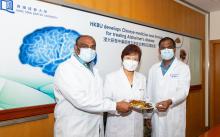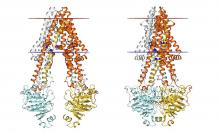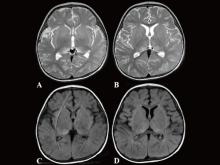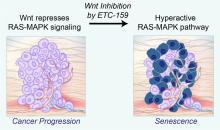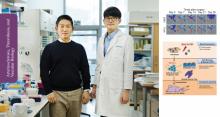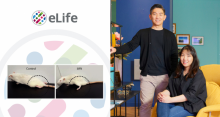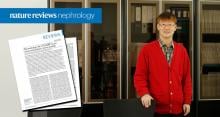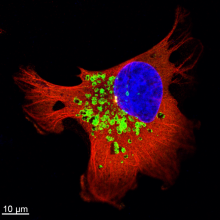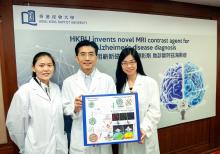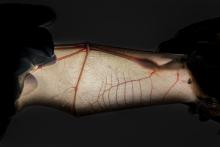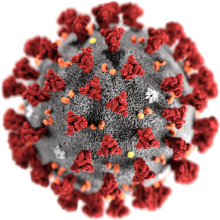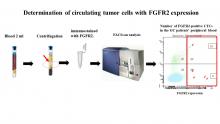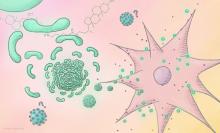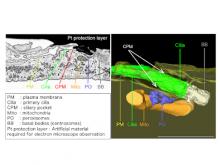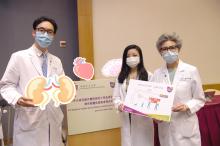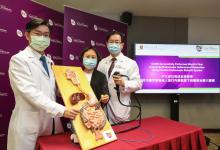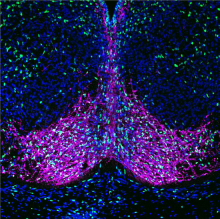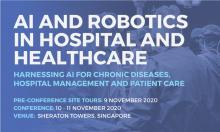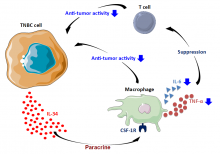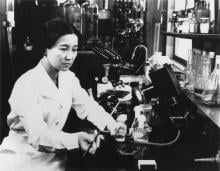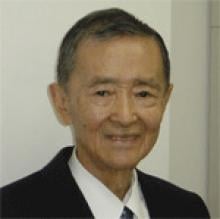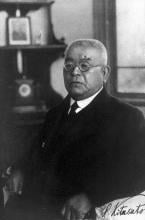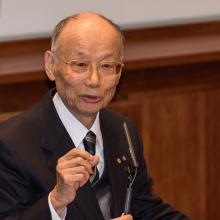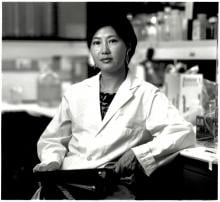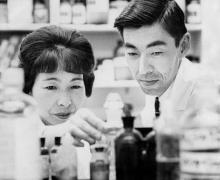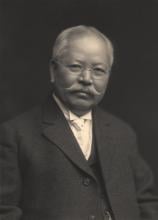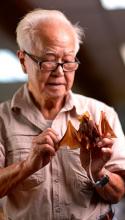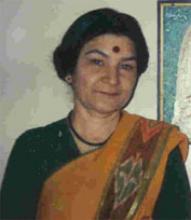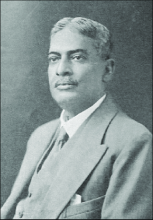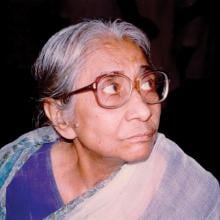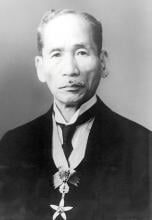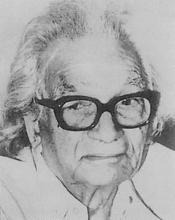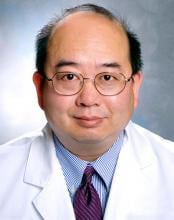Diseases
News
03 Feb 2021
Researchers from the School of Chinese Medicine (SCM) at Hong Kong Baptist University (HKBU) have developed a Chinese medicine formula named NeuroDefend that offers a potential novel treatment for Alzheimer’s disease (AD). Mouse model experiment results showed that the formula reduces the levels of amyloid-beta (Aβ) and insoluble hyperphosphorylated-tau protein, which are the major hallmarks of AD, in mice brains. It also improves cognitive function and memory in mice.
25 Jan 2021
The COVID-19 outbreak has brought unprecedented challenges to Hong Kong and, according to data from the Chinese Center for Disease Control and Prevention, the highest fatality rate has been in adults aged over 80. In view of this, Lingnan University in Hong Kong (LU) has launched a brand new programme to promote using Chinese medicine to prevent the transmission of COVID-19 in older adults, and reduce the infection risk in the spirit of “prevention is better than cure”.
19 Jan 2021
New ‘armoured’ T cells attack cancer without being suppressed by drugs given to transplant patients to avoid organ rejection.
28 Dec 2020
Investigations of a cellular protein have uncovered a possible link with schizophrenia.
28 Dec 2020
iCeMS scientists have revealed how a transporter protein twists and squeezes compounds out of cells, including chemotherapy drugs from some cancer cells.
21 Dec 2020
Researchers baffled by an infant’s rare encephalitis case unusual in children found unheard-of mutations and a new way to examine the “immunity gene.”
20 Nov 2020
A research team, affiliated with South Korea's Ulsan National Institute of Science and Technology (UNIST) has been selected as the recipient of a large-scale Social Science Korea (SSK) project of the National Research Foundation of Korea.
20 Nov 2020
Cancer is a disease driven by mutations that alter the way biochemical signals control cell growth, division and migration. Scientists at Duke-NUS Medical School found out that, like Goldilocks, cancer is very picky about getting rapid growth just right.
19 Nov 2020
A research team, affiliated with South Korea's Ulsan National Institute of Science and Technology (UNIST) has succeeded in generating bipotential self-renewing iVPCs by direct lineage conversion.
19 Nov 2020
A research team, affiliated with South Korea's Ulsan National Institute of Science and Technology (UNIST) established an advanced direct conversion strategy to generate iMNs from human fibroblasts in large-scale with high purity, thereby providing a cell source for treatment of SCI.
13 Nov 2020
A Singapore study finds patients with chronic kidney disease need tailored nutrition guidance, as well as better communication with doctors and family support, to empower them to manage their condition.
11 Nov 2020
U.S. Food and Drug Administration (FDA) issued an emergency use authorization (EUA) for cPass™ SARS-CoV-2 Neutralization Antibody Detection Kit on 6th November 2020.
10 Nov 2020
MANILA, PHILIPPINES (10 November 2020) — The Asian Development Bank (ADB) has partnered with leading healthcare knowledge provider, the BMJ, to launch a new online coronavirus disease (COVID-19) Information Centre for healthcare professionals tackling the pandemic.
03 Nov 2020
Professor Hyug Moo Kwon, affiliated with South Korea's Ulsan National Institute of Science and Technology (UNIST) has published a review paper at 'Nature Review Nephrology'.
03 Nov 2020
A group of students, affiliated with South Korea's Ulsan National Institute of Science and Technology (UNIST) has created a map to help track the spread of the COVID-19 in Ulsan region.
02 Nov 2020
Innovators clinched 25 Gold Awards, 7 Best Innovation Awards, and 5 Foreign Special Awards at
MTE2020 Special Edition : The COVID-19 International Innovation Awards
29 Oct 2020
Scientists have revealed the molecular mechanism regulating the trafficking of lysosomes that increases the invasiveness of radioresistant cancer cells following radiotherapy.
28 Oct 2020
Hong Kong Baptist University (HKBU) scientists have invented a novel contrast agent for magnetic resonance imaging (MRI), which enables real-time visualisation and detection of the size and number of amyloid-beta in the brain, a main hallmark of Alzheimer’s disease (AD). The invention offers hope for early detection and large-scale routine screening of AD. It can also help to assess the efficacy of drugs used to treat it.
26 Oct 2020
Study confirms bats adopt multiple strategies to reduce pro-inflammatory responses, thus mitigating potential immune-mediated tissue damage and disease. Findings provide important insights for medical research on human diseases.
21 Oct 2020
Although most people are likely to accept a future vaccine against COVID-19 if one is proven safe and efficacious, the hesitancy of those who refuse vaccination could stall global efforts to achieve community immunity, suggests a study published in Nature Medicine.
20 Oct 2020
Osaka City University detects cancer cells in 2ml blood samples and connects them back to their origin tumor – creating a new diagnostic tool that may aid in quicker and more accurate anti-cancer measures.
14 Oct 2020
Osaka City University unravels the atomic architecture of the “Nap” protein complex found on Mycoplasma pneumoniae.
01 Oct 2020
Scientists have found an ingredient that makes a vaccine more effective through an approach more often seen in materials science – testing molecules that self-assemble into larger structures.
01 Oct 2020
Scientists found out why people with Zellweger syndrome also get sick with genetic disorders linked to dysfunctions of the cilia or the cell’s “antenna.”
29 Sep 2020
Supported by the donation of over HK$35 million from The Hong Kong Jockey Club Charities Trust, The Chinese University of Hong Kong (CUHK) announced the results of the early phase of the CUHK Jockey Club Multi-Cancer Prevention Programme (the Programme) today. Since the commencement of the Programme in 2018, it has already provided screening services to over 3,000 eligible citizens. More than 70% of the participants were diagnosed either with adenoma or advanced adenoma through colonoscopy, while ten persons were diagnosed with colorectal cancer.
For those who underwent colorectal cancer screening, almost all of them were willing to be screened for another type of cancer. Subsequently, 15 participants were diagnosed with breast cancer and another 37 participants were diagnosed with prostate cancer. The research team believes that the screening results demonstrated the effectiveness of the “one-stop multi-cancer screening” model and advocates the implementation of this model to the cancer screening programme in the future.
24 Sep 2020
Deaths and major complications from diabetes have declined in older people over the last sixteen years but not at all in younger age groups, according to researchers from the Faculty of Medicine at The Chinese University of Hong Kong (CU Medicine). They analysed the data of 770,000 people with diabetes and found that over a 16-year period, the incidence of major complications such as coronary artery disease, heart failure and stroke declined by up to 80%, and deaths declined by 50%. The declines were mainly among older people with diabetes. There were no improvements seen for those under the age of 45.
Given the rising number of young people with diabetes and their high risks of complications and death, the research team calls for focused efforts to meet the needs of this group. Results of these studies have been published in medical journals including Cardiovascular Diabetology, Diabetologia, PLoS Medicine and Annals of Internal Medicine.
15 Sep 2020
Compared to Minimally Invasive Surgery, Endoscopic Submucosal Dissection (ESD) represents an advanced less-invasive endoscopic treatment for early gastrointestinal cancer. ESD has significant advantages as an organ preservation surgical treatment, but it is technically challenging with substantial risk of perforation and bleeding. The Faculty of Medicine at The Chinese University of Hong Kong (CU Medicine) has been collaborating with researchers from Singapore since 2010 to develop a flexible endoscopic robotic system. This novel system was specifically designed to enhance the safety and efficacy of ESD for the treatment of gastrointestinal cancer. Using the first prototype flexible endoscopic robot, our team at CU Medicine had successfully performed ESD for treatment of early gastric cancer in 2011. The flexible endoscopic robot is now further redesigned and developed for performing ESD in the colorectum– namely The EndoMaster EASE (Endoluminal Access Surgical Efficacy) System. CU Medicine led the world’s first clinical trial on robotic colorectal ESD using the EndoMaster EASE System which commenced in May this year and has demonstrated satisfactory outcomes thus far. Researchers believe this innovative technology will enhance advanced endoscopic resection and benefit more patients with early colorectal cancer who will require ESD treatment.
04 Sep 2020
Pregnant mice fed diets high in omega-6 fats and low in omega-3 fats are shown in a new study to produce offspring whose brains had a higher level of dopamine-producing neurons—the neurological reward system. These mice went on to chase hyper-caloric diets, suggesting that the fats in a pregnant mother's diet may control the eating habits of her children, and potentially offering a new obesity-prevention strategy.
03 Sep 2020
Conference will see leading regional thought leaders, policymakers, C-suite officers, senior and middle level hospital and healthcare, e-health, clinical operations, medical and nursing professionals convene to explore new ways to innovate and collaborate.
21 Aug 2020
Hokkaido University scientists have shown that Interleukin-34 is a prognostic marker and drug target for Triple Negative Breast Cancer.
Events
Sorry, no events coming up for this topic.
Researchers
Sorry, no researchers coming up for this topic.
- « first
- ‹ previous
- 1
- 2
- 3
Giants in history
Ruby Sakae Hirose (1904 – 1960) was a Japanese-American scientist whose research contributed significantly to our understanding of blood clotting, allergies and cancer.
Iranian physician and bacteriologist Azar Andami (8 December 1926 – 19 August 1984) developed a cholera vaccine to combat an outbreak that swept through the Middle East, India, Southeast Asia, and Africa in 1937.
Michiaki Takahashi (17 February 1928 – 16 December 2013) was a Japanese virologist who developed the first chickenpox vaccine.
Irene Ayako Uchida’s (8 April 1917 – 30 July 2013) strides to understand genetic diseases such as Down syndrome paved the way for early screening of chromosomal abnormalities in foetuses.
Baron Kitasato Shibasaburo (29 January 1856 – 13 June 1931) was a Japanese physician and bacteriologist whose work led to a new understanding of preventing and treating tetanus, diphtheria and anthrax.
By isolating soil microorganisms and studying the compounds they produce, Satoshi Omura (born 1935) discovered almost 500 organic compounds with unique properties that were produced by these microorganisms, including many new antibiotics.
Chinese-American virologist and molecular biologist Flossie Wong-Staal (27 August 1946 – 8 July 2020) was the first scientist to clone HIV and determine the function of its genes.
Maharani Chakravorty (1937 – 2015) was one of India’s earliest molecular biologists whose research paved the way for advances in the treatment of bacterial and viral infections.
Husband and wife team, Kimishige (3 December 1925 – 6 July 2018) and Teruko Ishizaka (28 September 1926 – 4 June 2019) discovered the antibody class Immunoglobulin E (IgE) that triggers allergic reactions. They also discovered that IgE antibodies attach to white blood cells, known as mast cells, releasing histamine, which causes allergic reactions.
Japanese chemist Takamine Jokichi (3 November 1854 – 22 July 1922) founded the Tokyo Artificial Fertilizer Company, where he isolated a starch-digesting enzyme (named takadiastase) from the fungus Aspergillus oryzae.
Lim Boo Liat (21 August 1926 – 11 July 2020), a leading authority in the conservation of Malaysia’s biological diversity, had his initial interest in the outdoors piqued by nature lessons in school. Lim, who helped found the National Zoo of Malaysia and re-establish the Malaysian Nature Society, had a particular interest in researching zoonotic diseases associated with small animals.
A pioneer of bio-organic chemistry, Darshan Ranganathan (4 June 1941 – 4 June 2001) is remembered for developing a protocol for synthesising imidazole, a compound used to make antifungal drugs and antibiotics. Widely considered India’s most prolific researcher in chemistry, she also published dozens of papers in renowned journals on protein folding, molecular design, chemical simulation of key biological processes, and the synthesis of functional hybrid peptides and nanotubes.
Indian scientist and physician Upendranath Brahmachari (19 December 1873–6 February 1946) is best known for creating a drug called Urea Stibamine, used to safely and reliably treat visceral leishmaniasis (or Kala-azar), a severe infection caused by the Leishmania parasite.
Filipino chemist and pharmacist Manuel A. Zamora (29 March 1870 – 9 July 1929) is best remembered for his discovery of the tiki-tiki formula to combat beriberi, a disease caused by Vitamin B1 deficiency.
Indian organic chemist Asima Chatterjee (1917 to 2006) studied the medicinal properties of plant products, especially compounds known as vinca alkaloids.
Umetaro Suzuki (7 April 1874 – 20 September 1943) was a Japanese scientist best remembered for his research on beriberi, a disease caused by vitamin B1 deficiency, characterized by limb stiffness, paralysis and pain.
Salimuzzaman Siddiqui (19 October 1897 – 14 April 1994) was an artist and chemist from Pakistan whose research focused on natural products from plants.
Barry Paw (29 August 1962 – 28 December 2017) was a biologist and oncologist who discovered several novel genes and their functions in red blood cells.


